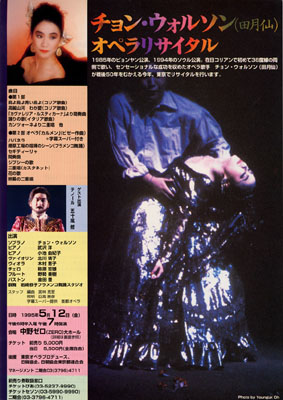38度線を越えた歌姫 田月仙オペラリサイタル  1995年5月12日(木) When Chon Wolson Sang However, by the late 1980's, Wolson was becoming unsatisfied with her career. The vocal techniques she had learned in Tokyo might have been good enough for a comfortable career in Japan, she decided that they were not sufficient for the world stage. She decided to take a year off and reconstruct her voice from the ground up. The only teacher in Japan capable of providing this training was a Taiwanese man who had had a successful Euhon Wolson sang the leading role in Georges Bizet's "Carmen" in the South Korean capital of Seoul last October, she became one of the hottest topics in the Korean media. Not only did her critically acclaimed performance relaunch her international singing career, but she became the first major artist to sing in both the North and South Korean capitals, an accomplishment of great symbolic importance to the Koreans. Back in 1985, she sang at a concert in Pyongyang for the late-North Korean President Kim Ilsung, who praised her talent and beauty. Things did not come easily for Wolson. Born in Tokyo in 1957, her parents had been brought to Japan in the pre-war period along with countless other Koreans to work in the mines and factories. After the war, the Korean Peninsula was divided into two opposing states, and the Koreans in Japan, along with their decendants, lost their Japanese citizenship and entered a political and legal limbo. In the following years, some acquired South Korean passports, a few became naturalized Japanese, but the majority, like Wolson, wound up with North Korean citizenship. Because Tokyo and Pyongyang do not have diplomatic relations, North Korean residents in Japan face special obstacals. The high school that Wolson graduated from was run by the North Korean residents association, and as such was not fully accredited by the Japanese Ministry of Education, limiting her prospects for higher education. Of course, her parents financial problems almost dashed all her hopes for admission to a musical university. While she was in high school, bankruptcy forced her parents to move away from Tokyo. In order to remain close to her music teachers, Wolson moved into a tiny three-tatami room and took a night-job playing the piano. Wolson's family eventually moved back to Tokyo and in the meantime she had gotten herself accepted to the prestegeous Toho Gakuen University music department. After graduating she started a successful career as an opera singer in Japan, joining the Nikikai Opera Company. In addition to her performance in Pyongyang, Wolson spent most of the 1980's performing in operas, concerts, and dinner shows throughout Japan as well as in China and the Soviet Union. She was a particularly big star among the North Korean residents and was called upon often to add artistic substance to their events commemorating special occasions, like the birthday of current president Kim Jongil. She made T.V. and radio appearences, was the subject of numerous newspaper and magazine articles, and even had a very interesting full-page color spread of her performing the Dance of the Seven Veils from Richard Strauss' Salome in Focus magazine. ropean career, and he had a reputation for driving his students so hard that they often wound up in the hospital. Week after week, month after month, Wolson made the five-hour round trip to the maestro's home in Zushi for lessons, going twice a week, three times a week, even more often when she had the money. Meanwhile, she maintained a rigorous practice schedule, taught students, and even helped out in her parents restaurant in Nakano. The task of overhauling her singing technique was a much bigger task than she over dreamed. Before she could begin learning the new technique, she had to unlearn the old one, which had become ingrained. What she thought would take one year - two at the most - wound up taking seven! During these years she stopped taking concert offers, stopped dating, stopped doing anything that was not connected with her one goal: to re-emerge as a world class singer. While during most of this period her self-confidence remained steadfast, towards the end even she started to have doubts. She re-examined her entire life and re-assessed her hopes and ambitions. It was at this time that she finally decided to change her citizenship to South Korea. For years she had been growing disallusioned with the political situation in North Korea, but like so many North Korean residents in Japan had resisted doing anything because of the negative repercussions it can have for their relatives in North Korea. The switch also allowed her to accept a long-standing offer from Seoul's Korean Opera Company to star in a production. Her great success in Carmen marked her comeback to the stage and also paved the way for a receital in Tokyo this May. The receital will take place in the brand-new Nakano Zero Grand Hall and will feature Wolson singing and dancing highlights from the opera "Carmen" as well as other Italian and Korean favorites. She will be backed up by some of Japan's best classical musicians.
|
